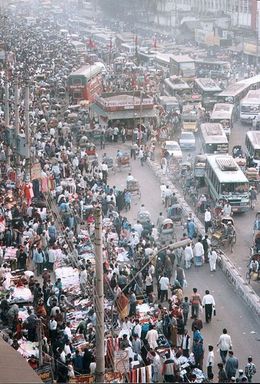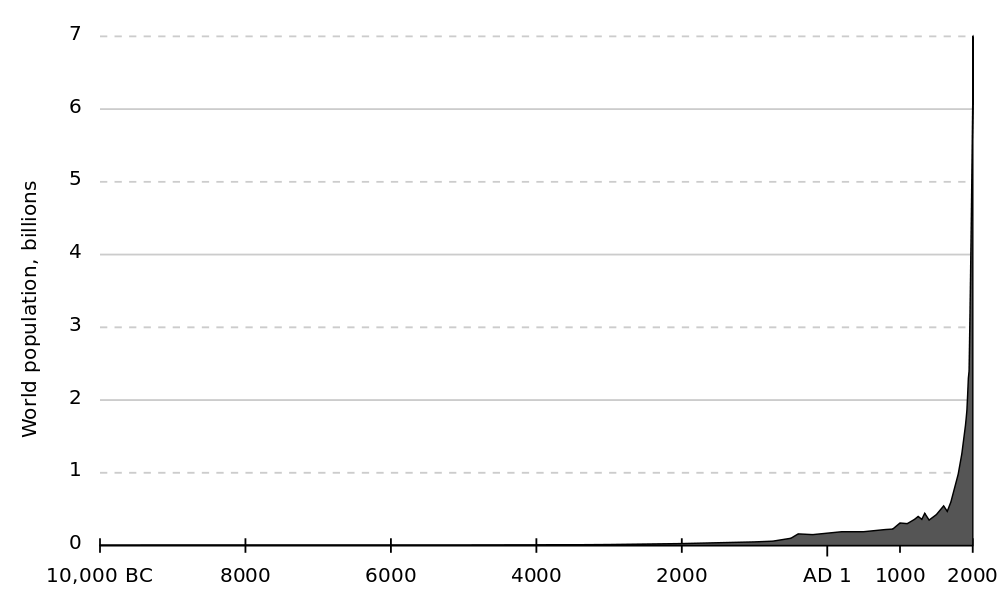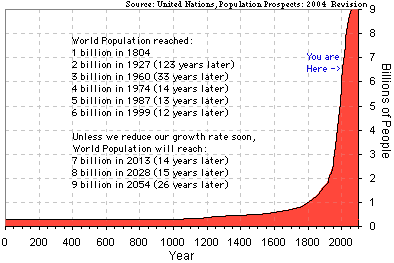Human Overpopulation
|
Navigation
"Increasing population growth and unsustainable consumption together pose two of the greatest challenges facing the world. A failure to act will put us on track to alternative futures with severe and potentially catastrophic implications for human well-being. The longer the delay, the more radical and difficult measures will be needed. Everyone has a role to play: individuals, non-governmental organisations, and both the public and private sectors. It is critical that national and international policy makers, acting individually and collectively, take immediate action to address these difficult but vitally important issues." ~InterAcademy Panel (IAP), the global network of science academies |
 Bangladesh crowds via Ahron de Leeuw on Flickr
Overpopulation occurs when an organism's numbers exceed the carrying capacity of its habitat. Human population is growing at a rate of approximately 78 million people per year with over 7 billion people living on the planet today and estimates reaching between 8 and 11 billion by 2050 and up to 15 billion by 2100. According to Steve Jones, head of the biology department at University College London, "Humans are 10,000 times more common than we should be." Human overpopulation is among the most pressing environmental issues, silently aggravating the forces behind global warming, environmental pollution, habitat loss, the sixth mass extinction, intensive farming practices and the consumption of finite natural resources, such as fresh water, arable land and fossil fuels, at speeds faster than their rate of regeneration. The global network of science academies, known as InterAcademy Panel (IAP), has issued a 2012 Statement on Population and Consumption, warning that: "Increasing population growth and unsustainable consumption together pose two of the greatest challenges facing the world. A failure to act will put us on track to alternative futures with severe and potentially catastrophic implications for human well-being. The longer the delay, the more radical and difficult measures will be needed. Everyone has a role to play: individuals, non-governmental organisations, and both the public and private sectors. It is critical that national and international policy makers, acting individually and collectively, take immediate action to address these difficult but vitally important issues." According to the Global Footprint Network, "Today humanity uses the equivalent of 1.5 planets to provide the resources we use and absorb our waste. This means it now takes the Earth one year and six months to regenerate what we use in a year. Moderate UN scenarios suggest that if current population and consumption trends continue, by the 2030s, we will need the equivalent of two Earths to support us. And of course, we only have one." As WWF puts it, "Humanity's demands exceed our planet's capacity to sustain us. That is, we ask for more than what we have." The growing world population will cause a "perfect storm" of food, energy and water shortages by 2030, with 'dire consequences'. Learn more.
|
"If we don’t halt population growth with justice and compassion, it will be done for us by nature, brutally and without pity – and will leave a ravaged world." ~ Nobel Laureate Dr. Henry W. Kendall |
Overpopulation Effects "Unlike plagues of the dark ages or contemporary diseases we do not understand, the modern plague of overpopulation is soluble by means we have discovered and with resources we possess. What is lacking is not sufficient knowledge of the solution but universal consciousness of the gravity of the problem and education of the billions who are its victim." ~Martin Luther King Jr. |
Overpopulation Solutions Stabilizing human overpopulation is possible through widespread availability of family planning, spreading awareness on the causes and effects of overpopulation, providing easier access to birth control devices and implementing social norms, such as social marketing strategies, to educate the public, particularly in developing countries, about overpopulation and provide them with the tools they need to make the decisions they want. |
|
IAP Statement on Population and Consumption
"The world’s 105 science academies are today (Thursday 14 June 2012) highlighting the global challenges of population and consumption and calling upon world leaders to take decisive action."
Your browser does not support viewing this document. Click here to download the document.
|
"Right now, with 7 billion of us: (1) We are driving over 50 species of plants and animals to extinction per day! (2) We are destroying rain forests many times faster than they can regenerate. (3) We are consuming stored solar energy (fossil fuels) at rates thousands of times faster than it is regenerating. (4) We are consuming fresh water at least 10 times faster than it is being replenished in regions of northern Africa, the Middle East, India, Pakistan, China, and the U.S. (5) We are causing soil salinization and erosion several-fold faster than rates of restoration. (6) We are over-fishing our oceans, radically changing the species balance in many places." ~ World Population Balance |
|
|
"Two-thousand years ago, our population was at 250 million. In the year 500 A.D., it remained the same. By 1000 A.D., we climbed to 500 million people. We reached 750 million people around 1500 A.D. We hit our first billion mark in 1800 at which time the Industrial Revolution kicked in. We added people more rapidly and began to move quickly in the direction of human overpopulation. Between 1800 and 1900 we added 600 million people. At 1900, we were at 1.6 billion. By 1960, in 60 short years, we nearly doubled that as we reached 3 billion. In 1960, we humans had been here about 150,000 years. It took us that long to accumulate 3 billion people. How long did it take for us to double that number? Thirty-nine years! In 1999, we reached 6 billion people. It is estimated that we will be at 9.2 billion by 2050. This is an exponential increase in birth rate, leading to questions concerning Earth’s carrying capacity." ~Joseph R. Simonetta |
|
Last Revised: 11/20/13
Commenting Rules |





